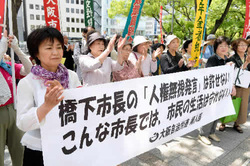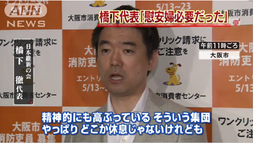 Source: www.gera-gera.com
Source: www.gera-gera.com The first of these developments was the decision by the `Your Party` on the 23rd of May to cancel its planned cooperation with the Japan Restoration Party in the upcoming election, citing `differences in basic values` as the reason for terminating its links (J). On the same day, Matsumoto Kazumi, the Japan Restoration Party`s candidate for an Upper House seat, handed in his resignation to the Party executive, claiming that Mayor Hashimoto`s statements concerning `comfort women` clashed with his own political beliefs (J – a position he made clear in a post on his blog on the 20th of May). In spite of the flippant nature by which Restoration Party Matsui Ichiro shrugged off Matsumoto`s resignation, saying that it was inevitable for someone with `no fortitude` (覚悟のない人) , Hashimoto`s remarks are having an effect on his party`s popularity, as witnessed by a planned supporters meeting in Tokyo over the weekend in which only 40 of an estimated 200 attendees showed up (J – according to this Mainichi newspaper poll, 71% of respondents thought that Hashimoto`s statements were `invalid` - J).
Clearly the Japan Restoration Party has a major issue with this (and possibly other) aspects of Japan`s wartime conduct, as witnessed by a number of other `gaffes` by party members describing former `comfort women` as having `withered old skin` (J) or Nishimura Shingo`s declaration that there `is an abundance of Korean prostitutes, and that in Osaka it`s ok to call them `comfort women` (J – a statement for which he was later forced to resign from the party). For a political party attempting to make itself an alternative to the LDP/Komeito/DPJ triumvirate, the Restoration Party is certainly doing its best to undermine confidence in its judgement and Japan`s relationship with its principal ally (as witnessed by the Obama administration`s condemnation of Hashimoto`s remarks. Hashimoto claims to have been misquoted, and that he never said that `comfort women` were `necessary`. This contradicts the record of his media conference on the 13th (J), and looks like little more than a desperate attempt to divert foreign media attention. Need less to say, it hasn`t worked).
As Hashimoto has said that he is planning to visit the US during June, it will be interesting to see just how successful such a visit will be (assuming he goes ahead with it). Hashimoto`s comments have already had an effect on Osaka`s sister city relationship with San Francisco (no word from Sydney yet!), and been condemned by Ed Royce, the Republican chairman of the US House of Representatives Foreign Relations Committee (J). US politicians may be very wary of being seen in public with such a controversial figure, not to mention their own reservations concerning Hashimoto`s character. Even if Hashimoto were to express an unreserved apology, few would believe its sincerity given the amount of time that has already passed and the subsequent messages from other party members. The `cat is out of the bag`, so to speak, and no amount of apologising will remove the suspicions surrounding the Restoration Party`s misogynistic, reactionary political views.

 RSS Feed
RSS Feed